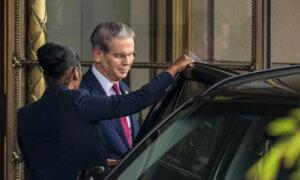Trump suggested a ’total reset’ was possible between the two countries as both sides settle into the second and final day of planned discussions in Geneva.
The United States and China resumed critical tariff negotiations on May 11 as ongoing trade relations remain sour after both nations imposed staggeringly high tariffs on one another this year.
While Beijing has not yet publicly commented on the negotiations, Xinhua, its official news agency took a hardline approach and said China will reject any proposals that undermine “global equity.”
Neither Trump nor the White House offered additional details on the trade talks during and after the first day of negotiations.
Discussions between the United States and China could help stabilize the world markets still reeling from the tit-for-tat tariff war between the two nations, with some ships in port with goods from China still unwilling to unload until they know the final decision on import tariffs.
The negotiations have occurred behind closed doors, with neither side offering details to reporters as they left on Saturday.
Multiple convoys of black vehicles have been spotted entering and leaving the residence of the Swiss ambassador to the United Nations delegations in Geneva, which is hosting the discussions intended to de-escalate trade relations between the world’s two largest economies.

A convoy carrying the U.S. Secretary of Treasury arrives to the residency of the permanent Swiss Ambassador to the United Nations offices during talks between Seniors U.S. and Chinese officials on tariffs, in Geneva on May 11, 2025. Valentin Flauraud/AFP via Getty Images
Trade between China and the United States topped more than $660 billion last year.
“80% Tariff on China seems right! Up to Scott,” Trump wrote in a Friday Truth Social post, referring to Treasury Secretary Scott Bessent.
Bessent is the lead negotiator for the Trump administration in trade discussions with China.
The series of talks over the weekend marks the first time both sides have met in person to discuss tariffs amid the ongoing trade war. Even a minimal drop in tariffs could be seen as a breakthrough.
Trump initially imposed a 20 percent tariff on Chinese goods alongside 25 percent tariffs on Mexico and Canada after accusing the three countries of contributing to the illegal trafficking of fentanyl, a powerful synthetic opioid, into the United States.
The president then added additional tariffs on China, which included reciprocal measures, to bring the total levies on Chinese goods to 145 percent.
Trump has also targeted China’s trade deficit with the United States, which reached $295.4 billion last year.
Xi Jinping, leader of the Chinese Communist Party, is visiting Russian President Vladimir Putin in Moscow this weekend, which casts a shadow on hopes that tariff negotiations between the United States and China could lead to broader improvement in relations between the two countries.
Bessent emphasized the national security component of trade negotiations with China.
“I look forward to productive talks as we work towards rebalancing the international economic system towards better serving the interests of the United States.”
Andrew Thornebrooke and The Associated Press contributed to this report.
Original News Source Link – Epoch Times
Running For Office? Conservative Campaign Consulting – Election Day Strategies!


